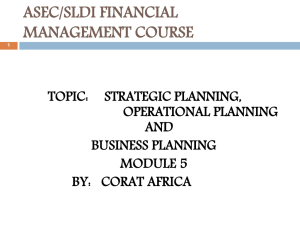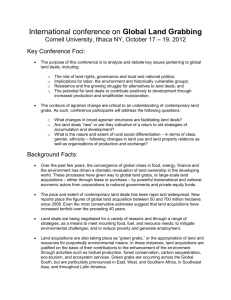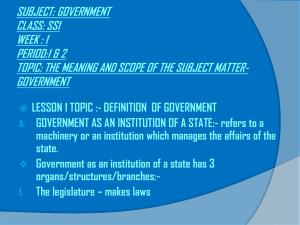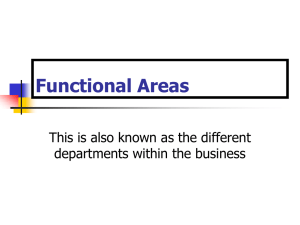Press-release-on-Global-Land-Grabbing-II
advertisement
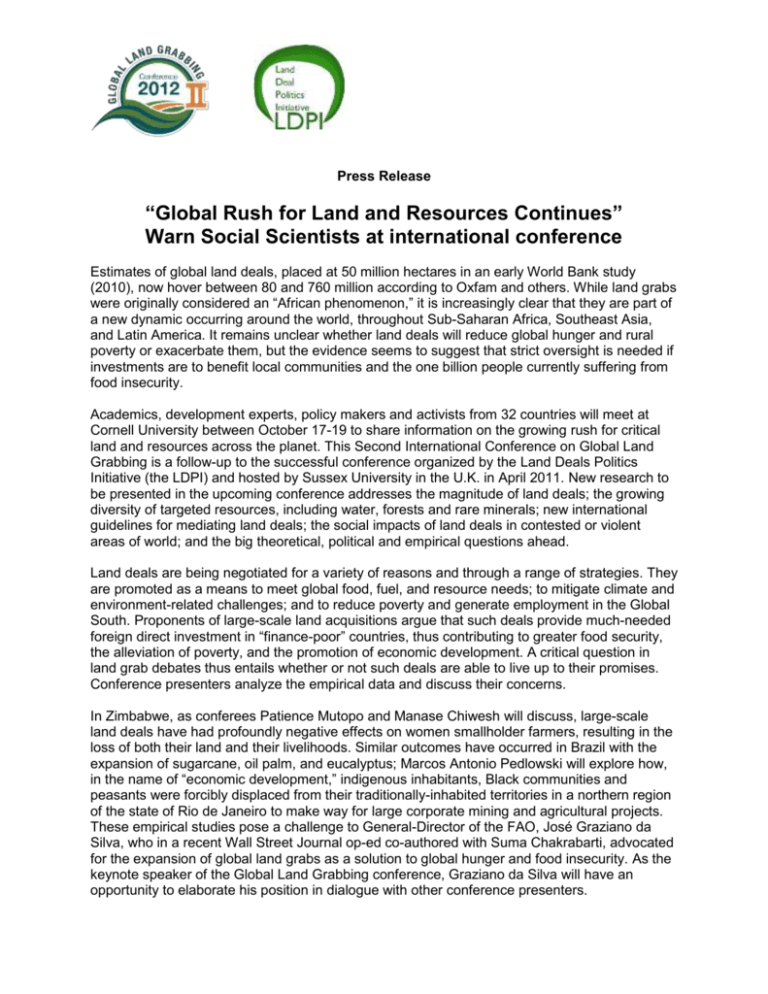
Press Release “Global Rush for Land and Resources Continues” Warn Social Scientists at international conference Estimates of global land deals, placed at 50 million hectares in an early World Bank study (2010), now hover between 80 and 760 million according to Oxfam and others. While land grabs were originally considered an “African phenomenon,” it is increasingly clear that they are part of a new dynamic occurring around the world, throughout Sub-Saharan Africa, Southeast Asia, and Latin America. It remains unclear whether land deals will reduce global hunger and rural poverty or exacerbate them, but the evidence seems to suggest that strict oversight is needed if investments are to benefit local communities and the one billion people currently suffering from food insecurity. Academics, development experts, policy makers and activists from 32 countries will meet at Cornell University between October 17-19 to share information on the growing rush for critical land and resources across the planet. This Second International Conference on Global Land Grabbing is a follow-up to the successful conference organized by the Land Deals Politics Initiative (the LDPI) and hosted by Sussex University in the U.K. in April 2011. New research to be presented in the upcoming conference addresses the magnitude of land deals; the growing diversity of targeted resources, including water, forests and rare minerals; new international guidelines for mediating land deals; the social impacts of land deals in contested or violent areas of world; and the big theoretical, political and empirical questions ahead. Land deals are being negotiated for a variety of reasons and through a range of strategies. They are promoted as a means to meet global food, fuel, and resource needs; to mitigate climate and environment-related challenges; and to reduce poverty and generate employment in the Global South. Proponents of large-scale land acquisitions argue that such deals provide much-needed foreign direct investment in “finance-poor” countries, thus contributing to greater food security, the alleviation of poverty, and the promotion of economic development. A critical question in land grab debates thus entails whether or not such deals are able to live up to their promises. Conference presenters analyze the empirical data and discuss their concerns. In Zimbabwe, as conferees Patience Mutopo and Manase Chiwesh will discuss, large-scale land deals have had profoundly negative effects on women smallholder farmers, resulting in the loss of both their land and their livelihoods. Similar outcomes have occurred in Brazil with the expansion of sugarcane, oil palm, and eucalyptus; Marcos Antonio Pedlowski will explore how, in the name of “economic development,” indigenous inhabitants, Black communities and peasants were forcibly displaced from their traditionally-inhabited territories in a northern region of the state of Rio de Janeiro to make way for large corporate mining and agricultural projects. These empirical studies pose a challenge to General-Director of the FAO, José Graziano da Silva, who in a recent Wall Street Journal op-ed co-authored with Suma Chakrabarti, advocated for the expansion of global land grabs as a solution to global hunger and food insecurity. As the keynote speaker of the Global Land Grabbing conference, Graziano da Silva will have an opportunity to elaborate his position in dialogue with other conference presenters. Another critical issue in large-scale land acquisitions is the role of “green grabs,” or the appropriation of land and resources for purportedly environmental means. In these instances, land deals are justified on the basis of their contributions to the enhancement of the environment through activities such as biofuel production, forest conservation, carbon sequestration, eco-tourism, and ecosystem services. In Ecuador, for instance, a new collaborative governance arrangement comprised of palm oil companies, domestic NGOS, and the World Wildlife Foundation have attempted to set baseline conditions through which environmental and social sustainability can be ensured in the development of the palm oil industry. However, these efforts, as conferee Adrienne Johnson suggests, are often inadequate in their promotion of “sustainability,” and when framed solely in market-based terms may facilitate the expansion of large-scale land deals in the country, exacerbating social injustices and environmental degradation. The research on international land deals presented at the conference also illuminates the challenges and possibilities associated with rights-based approaches to property, resources, livelihoods and security. In Cambodia, as conference participant Michael Dwyer notes, attempts to systematically establish property rights through land titling has allowed a seemingly apolitical technology to facilitate land grabbing. In a different context, rights-based discourses have been used by UN Special Rapporteurs to put pressure on the Bangladeshi government to reject a corporate-led attempt to acquire land for coal mining. The UN Special Rapporteurs’ use of human rights discourses in this case, attendee Heather Bedi argues, serves as a means of public scrutiny by illuminating the ways in which the land deal will violate human rights by “displac[ing] hundreds of thousands of people, while destroying fertile agricultural land.” Greg Myers, with USAID, presents a radically new paradigm for tenure reform that goes well beyond simply endorsing land titles and registration. Questions pertaining to the effects of liberal discourses and practices serve as a critical theme in debates around global land grabs that will be explored in the conference. One of the most profound features of contemporary land grabs is the restructuring of global social relations. While there is a clear North-South dynamic that echoes the large-scale land deals that underwrote both colonialism and imperialism, contemporary land grabs are also occurring between nations and actors within the Global South, with economically powerful countries, such as Brazil, India, China, South Africa and Qatar, becoming significantly involved in everything from land acquisition to infrastructure development and knowledge transfer. Brazil, for instance, has engaged in African agriculture through development, infrastructure, and research, even sending their own farmers to Mozambique with subsidized loans to buy land. Trade between African and Brazil has risen from $4 billion in 2000 to almost $28 billion in 2010 and many Brazilian multinationals in mining, oil, and construction industries have moved in to Mozambique to expand operations and offer alternatives to Western and Chinese developers. Conference attendees Elizabeth Clements and Bernardo Mançano Fernandes will address contemporary relations between Brazil and Mozambique, and the impacts these relations are having on the peasantry in both countries. New research suggests that land grabs are both a product of and generating further violence in conflict zones around the world. Conferee Alejandro Camargo will report on the displacement of peasants and erosion of forest and aquatic ecologies in Colombia as a result of land concentration and conversion of wetlands into arable land for large-scale agricultural production. Other attendees will discuss experiences of land dispossession, resettlement, and ecological degradation in countries such as China, Zimbabwe, South Sudan, Ethiopia and Cambodia. These papers highlight the role of ethnic and economic discrimination in shaping both winners and losers in the contest over access to land. While dispossession, environmental degradation, and the loss of livelihoods are widespread features of global land grabs, responses to foreign land acquisition are mixed, illuminating the necessity for empirical analysis of the differential effects of large-scale land deals. On one hand, global land deals, and associated development projects, are being hotly contested. National governments, (trans) national peasant organizations, NGOs, and local communities are challenging large-scale land acquisitions in a variety of ways. Green grabbing projects such as Payments for Ecosystem Services (PES) and Reducing Emissions from Deforestation and Forest Degradation (REDD+), are being condemned as “new forms of enclosure and dispossession” throughout the Global South, as conference participant Kathleen McAfee will discuss. Zoe Brent demonstrates how in Argentina, local and indigenous communities are using formal legal systems and frameworks to contest large-scale land deals and assert their legal rights to land and resources. But opposition and resistance to international land deals are not universal. As Christophe Gironde will show, indigenous smallholders in Cambodia are optimistic about the emergence of large rubber-tree plantations that are accompanying a restructuring in land use and agricultural development in the region; new business models such as contract growing and alternative crops have provided benefits to local communities and governments. Such findings suggest that large-scale land deals can benefit local communities, and conferees will discuss the conditions under which this might happen. These critical issues and more will be explored through the presentation of more than 135 papers in 33 conference panels, in addition to five plenary sessions. The Director-General of the FAO, José Graziano da Silva, will deliver a keynote address, arriving directly from the World Food Meetings taking place in Rome earlier that week. Noted scientific writer, Fred Pearce, will discuss his new book, The Land Grabbers. Klaus Deininger from the World Bank will discuss the methodologies employed in studying land deals, and Indra Lubis from Via Campesina will outline the perspective from international civil society. Researchers from the international research centers such as the International Institute for the Environment and Development (IIED, UK), the Center for the Study of Land and Agrarian Studies (PLAAS, South Africa), the Institute for Development Studies (IDS, UK), the Center for International Cooperation on Agricultural Research and Development (CIRAD, France), the International Land Coalition (ILC, multilateral) and more will present the latest research results from comprehensive studies. The topic of the conference ties directly into Cornell’s land grant mission as well as into the goal of internationalizing the university. Cornell is becoming a hub of research related to land deals, as evidenced by the selection of a team on Land Deals for a three-year theme project (2012 – 2015) funded by the Institute for Social Sciences. Over a dozen scholars from Cornell will participate in the meeting, chairing sessions and delivering papers. The conference is cosponsored by the Institute for Social Sciences, the Polson Institute of Development Sociology (pending), the Atkinson Center for a Sustainable Future and the Einaudi Center (pending). General enquiries: landpolitics@gmail.org For media inquiries, or for further information on the conference and research, please contact: Susanna Thorp, WrenMedia, S.Thorp@wrenmedia.co.uk Nathan Oxley, IDS, N.Oxley@ids.ac.uk Wendy Wolford, Cornell: www43@cornell.edu Notes for Editors 1. The conference is being organized by the Land Deals Politics Initiative and is hosted by the Department of Development Sociology at Cornell University, Ithaca, NY. 2. Panels include discussants from International Food Policy Research Institute, International Institute of Social Sciences, Cornell, ISSER (Ghana), International Institute for Environment and Development, University of the Western Cape, China Agricultural University, World Bank, UK Department of International Development, Institute of Development Studies, and many more plus plenary discussions that will debate methodology, the big questions, multilateral governance and world food concerns. 3. The conference program, presentations and background resources are available at www.cornelllandproject.org.
